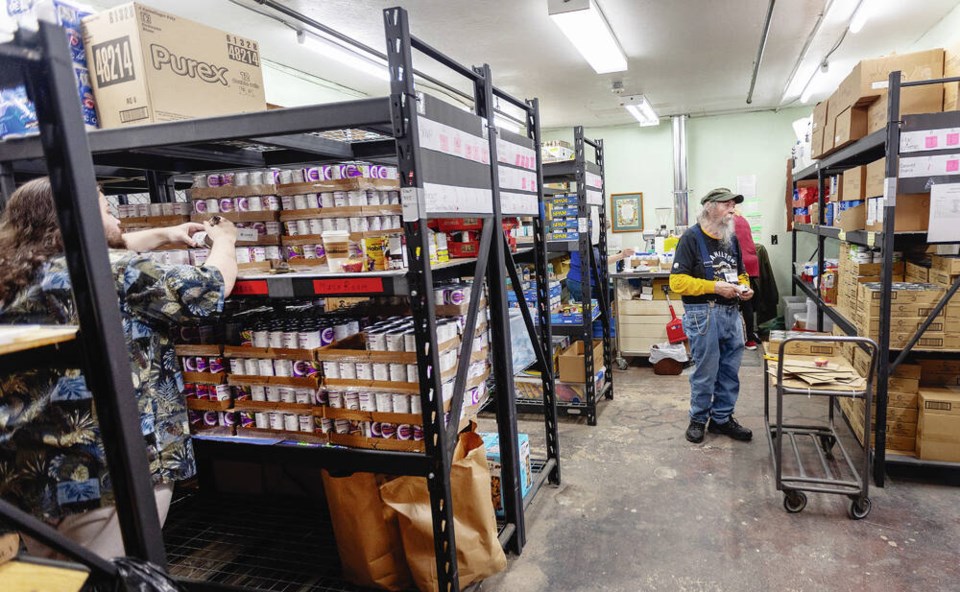Here’s a simple lesson in civics. When people are pushed to the margins, they feel outside, because they are.

Siddown. Let’s talk. You good with your coffee, or you need a top-up?
Did you catch the recent news in theFinancial Timesthat one in three Canadian kids suffers from food insecurity, and that altogether an estimated ten million Canadians — one-quarter of the country’s population — are facing food insecurity?
The phrase covers a range of griefs — everything from worry about running out of food (money) to skipping meals to daily visits to food banks, shoplifting, dumpster diving, I suppose, and other improvisations that will fill the belly.
You know anybody like that? Didn’t think so. Me neither. Must be the hysterical media crisis-hunting. Or maybe it’s happening in some other part of Canada. Big country, you know.
Maybe things will improve quickly and noticeably under Carney’s leadership.
What is not speculative, but evidence-based, is that supermarket prices in Victoria are rising like the tide. You shop. You know I’m not making this up.
I buy club soda, two-litre bottles, at Walmart. $1.05 a year ago. $1.28 six months ago. $1.48 now. Same damn water. Same damn bubbles.
Know what else is going up? Theft, shoplifting. Retail predation, if you prefer the ten-dollar word. Stores are putting things behind glass (charming). Some markets are reducing or eliminating self-checkouts. Too easy to boost (everything’s a potato).
Let me assure you with near-certainty that prices will continue to rise and social pressure will mount. There is no one less law-abiding than a hungry person.
People, quips some online philosopher, are “nine meals away from anarchy.”
As petty but desperate criminality goes up, and as more and more people learn about brazen acts, the social mood changes. Community self-confidence is actually quite fragile; it perforates easily.
The numbers of the marginal increase become more visible. They walk around with a purposeless shuffle, and your radar easily picks it up. Downtown turns increasingly into a no-go zone. Downtown gets hit the worst because policing isn’t proprietary, not like nabes or ‘burbs.
Stores look increasingly like they’re in lockdown mode. No fun. Cop cars, flashers on, become more noticeable.
Let’s role-play: Two slices of bread were lunch. You have nothing to eat for dinner. Do you spend suppertime fantasizing you’re at a gallery presentation about Late Victorian Decorative Floral Motifs, or are you testing car doors in the London Drugs parking lot?
Times are tough. They may get rougher. If it’s less visible here, so far, we have very busy food banks and other saints to thank.
If need and hunger expand, we, through a combination of distraction, denial and outright disinterest, are not ready. We have no Plan A, let alone the rest of the alphabet.
Here’s a simple lesson in civics. When people are pushed to the margins, they feel outside, because they are. The rules of the inside code become less relevant. Niceties fall away quickly, replaced by various urgencies.
Food. Shelter. Essential mobility. Medical aid. Protection. Inclusion. The list of needs is short and pretty much free of abstraction. That’s Plan A.
I don’t have a planning blueprint in mind, but there are people in our community who are brilliant at such work.
I do know that the entire Crystal Pool escapade, starting with the inebriated political assumption that a brand new pool/rec centre is a community priority, was and remains a self-indulgent public folly revealing community immaturity and lack of gravity — a specific failure of city council to intervene.
And you think: “Oh, for God’s sake, stop spinning nightmares just to highlight a modest, manageable and unlikely concern.”
I invite you, in turn, to consider another small, unlikely concern dubbed Pandora Avenue. We handled that well, don’t you think? No impacts. No social or financial consequences.
Would you like to guesstimate downtown’s lost revenue from people who see Pandora and say I’m outta here? How about a modest $250,000 a day (Costco on its own does a million-eight) times, say, five years, excluding Sundays. Does that seem reasonable? That’s $375,000,000.
Canadian-American political commentator David Frum, recently interviewed, accurately described the current Canadian moment as “existential.”
In aGuardianpiece titled “Systems Are Crumbling,” Adrienne Matei profiles a surreal current social situation where the structures of governance and social management are collapsing, but daily life seems normal.
I understand from a letter in this paper that direct public involvement in Victoria’s draft Official Community Plan is 1.5 per cent.
98.5 per cent of us were and are bystanders.
Where does this go? Nowhere near Plan A.
Gene Miller is the founder of Open Space, founding publisher of Monday Magazine, originator of the Gaining Ground urban sustainability conferences, founder/developer of ASH houseplexes and currently writing “Nothing To Do: Life in a Workless World.” He’d be pleased to receive and respond to your thoughts.[email protected]